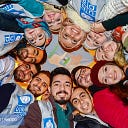Youth led Campaign with Accelerator lab Syria: “Who knows, it might come in handy one day”.
By: Kenda Alzaim
Head of solutions mapping, Accelerator Lab Syria
Enter any Syrian household and you will find that, by the force of habit, they have stores of recyclable materials; a big plastic bag full of smaller plastic bags, a corner under the sink reserved for reusable plastic bottles , empty metal cans full of old screws and nails, and neatly flattened & stored cartoon boxes… The reason why this “junk” is being stored is because “who knows, one day they might come in handy”. That is the main message behind the accelerator lab campaign #الا_ما_تنفع (#itmightbeuseful) that was launched in collaboration with Shebak Souri, a local youth led platform.
The campaign, which was part of the accelerator lab work on highlight novelties in household recycling practices, had two main purposes: First, to highlight stories and solutions of positive deviants in the Syrian community, who are recycling, reusing, and repurposing different materials in innovative ways and who are able to save money from utilizing these recyclable materials. Second, to educate the platform audience, mainly youth, on what is recyclable — and why waste contamination reduces value and might cause a health hazard for both the individual and formal/informal sanitary workers.
Extended over the period of three weeks, the campaign was made up of 7 videos and 14 posts. The videos featured 5 recycling stories whilst the other two focused on the benefits of recycling especially in times of crises. The posts were designed in a way to reduce confusions concerning the recycling of different categories of materials. Each of the posts was dedicated to one recyclable material explaining how it can be recycled correctly.
Working with youth:
The concept of the campaign was co-designed with Shebak-Souri, a local youth led platform that supports youth and raise awareness about youth issues and challenges. As for the production, direction and designing of posts and videos they were all made depending on the resources and talents available within Shebak Souri network. This way, the campaign achieved another indirect positive outcome: empowering youth led initiatives and encouraging youth to be leaders and positive change makers in their communities.
Worthy insights:
After analyzing the data gathered from audience’s interaction with the campaign through comments, reactions (positive and negative) and evaluating the reach of the post; we reached the following insights:
In addition to informing us to new and innovative grassroots recycling initiatives within Syria that we were not aware of; the interactions indicated that there is a level of awareness about recycling among audience, but only at a very basic level. Although people know about recycling, they are still unfamiliar with topics related to correct segregation, health hazards from contaminated waste, potential for a circular economy and its importance within a crisis context. Another interesting insight that confirmed our previous findings is the increased number of waste pickers across Syria. Several people pointed out that waste pickers are sometimes the only source of waste collection in many communities. This means that there is a serious need for NGOs, international or national to start investing its resources to encourage working with this marginalized group of people to organize their work and improve their working conditions without causing any harm to them or to their informal work.
Check below some of the interesting videos that have been shared on this campaign:
